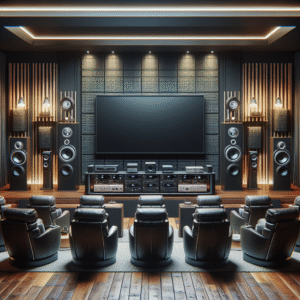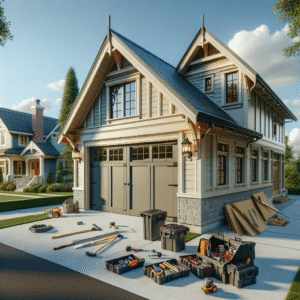Thinking of enhancing your home’s energy reliability? Home generators are a game-changer for maintaining power during outages, adding value and comfort to your lifestyle. In this comprehensive guide, we delve into the various types of home generators, installation tips, and the essential cost and maintenance insights that every homeowner should know. Whether you’re facing storm-related power disruptions or just want peace of mind, understanding the ins and outs of home generators is the first step towards a more secure and efficient home.
Understanding the Types of Home Generators: Features and Benefits
Home generators come in a variety of forms—each with its own set of features and benefits suited to different needs. From portable units that offer flexibility and ease of use, to standby generators that provide seamless power supply during outages, choosing the right generator can significantly enhance your home’s functionality. We’ll explore the key differences between these types, helping you make an informed decision based on your household’s energy requirements and budget.
Installation Essentials: Key Steps and Safety Guidelines for Home Generator Setup
Proper installation is crucial for the safe and efficient operation of your home generator. This section will guide you through the necessary steps to install your generator, along with critical safety guidelines to ensure it functions optimally. Whether you’re a DIY enthusiast or planning to hire a professional, understanding these fundamental principles can help you streamline the process and avoid common pitfalls.
Cost Analysis and Maintenance: Investing in a Home Generator for Long-term Reliability
Investing in a home generator involves initial setup costs and ongoing maintenance to ensure longevity and reliability. We will provide a detailed breakdown of the expenses associated with purchasing and running a generator, alongside practical maintenance tips to keep your unit in top condition. This analysis will help you budget effectively and maximize the return on your investment.

If you’re ready to take your home improvement or construction project to the next level, we can help! Find trusted contractors on BuildNet, whether you’re looking for renovations, new builds, electrical work, plumbing, or anything in between. Our directory connects you with qualified professionals who can make your vision a reality.
Understanding the Types of Home Generators: Features and Benefits
Hey there! If you’re diving into the world of home generators, you’re probably looking for a reliable backup power source, right? Whether it’s due to frequent power outages or just planning for emergency situations, choosing the right type of generator can be a game-changer for your peace of mind and comfort. Let’s unpack the different types of home generators and explore their features and benefits to help you make an informed decision.
Portable Generators: Your Go-To for Flexibility
First up, let’s talk about portable generators. These units are the MVPs when it comes to flexibility and are perfect for occasional use. Here’s why they might just be what you need:
- Cost-effective: Generally, portable generators are more budget-friendly compared to their stationary counterparts.
- Easy to use: With minimal setup required, these generators are pretty much plug-and-play.
- Versatility: Need to power up a campsite or a tailgate party? Your portable generator has got you covered.
However, remember that they typically run on gasoline, which can be a hassle to store and refill, and they might not be powerful enough to run your entire home.
Standby Generators: The Ultimate Peace of Mind
Now, if you’re looking for something more robust, standby generators are your best bet. Designed to kick in automatically during power outages, these generators offer seamless power restoration:
- Automatic operation: No need to step outside in a storm—standby generators start up on their own when the power goes out.
- Power capacity: They can handle much more load, often enough to power your entire house.
- Natural gas or propane: No refueling woes here, as most models hook up to your existing gas lines.
While they are more expensive and require professional installation, the convenience and capacity they offer are often well worth the investment.
Inverter Generators: Quiet, Efficient, and Clean
If noise is a concern and you want something efficient for smaller loads, inverter generators might just tick all the boxes. They’re great for activities that require quieter operation and clean power:
- Quiet operation: Perfect for camping trips or neighborhoods with strict noise regulations.
- Fuel efficiency: These generators adjust the engine speed to the load, conserving fuel and reducing emissions.
- Portable: Most inverter generators are light and easy to move around, offering great versatility.
Solar Generators: Harnessing the Power of the Sun
Last but not least, let’s not forget about solar generators. These are a fantastic option if you’re environmentally conscious and prefer a sustainable and silent source of backup power:
- Eco-friendly: With no fuel needed, solar generators produce zero emissions.
- Silent operation: They’re incredibly quiet since they have no moving parts.
- Low maintenance: Solar generators require very little upkeep, thanks to their simple design.
Keep in mind, though, that the initial set-up can be pricey and their power output might not be suitable for large appliances or extended use without adequate sunlight.
Choosing the Right Generator for Your Home
Selecting the right generator involves weighing the pros and cons of each type based on your specific needs. Consider the following:
- Power requirements: How much wattage do you need to run essential appliances?
- Budget: What’s your spending limit?
- Fuel availability: Can you easily access the fuel needed for the generator?
- Local regulations: Are there noise ordinances or other local regulations that might affect your choice?
By understanding the different types of home generators and their unique features, you can choose a backup power solution that not only meets your needs but also fits seamlessly into your lifestyle. Whether it’s weathering a storm or just ensuring your outdoor party goes off without a hitch, the right generator can make all the difference.
Remember, when it comes to home improvement and essential appliances, local expertise matters. For those of you in [Your City], tapping into local knowledge and resources can ensure that you get the best out of your investment. Consider consulting with a local expert to help guide your choice and installation.

Installation Essentials: Key Steps and Safety Guidelines for Home Generator Setup
Welcome to BuildNet, your trusted guide through the often intricate world of home generators! Whether you’re a seasoned homeowner or a first-time buyer, setting up a home generator is a critical process that requires attention to detail and adherence to safety protocols. We’re here to walk you through the key steps and safety guidelines to ensure your home is powered safely and efficiently.
Choosing the Right Location
Step one in generator installation is selecting the perfect spot. You’ll want a location that is:
- Safe: Choose a spot away from windows, doors, and vents to prevent exhaust fumes from entering your home.
- Accessible: Make sure there is enough room around the generator for easy maintenance and repairs.
- Dry and Level: Set up your generator in a dry area to prevent water damage and on a stable, flat surface to avoid vibration.
Remember, local codes and regulations may influence your choices here, so it’s always a good idea to consult with a local contractor or installation expert from your area. They can provide insights specific to your locality, from Seattle’s rainy weather specifics to the sandy soils of Miami.
Preparing the Installation Site
Before you install your generator, there are a few preparatory steps that are crucial:
- Clear the Area: Remove any debris or vegetation around the installation site. This reduces the risk of obstruction and enhances airflow, which generators need to operate efficiently.
- Install a Concrete Pad: Generators should ideally be placed on a concrete pad, which supports the generator and keeps it stable.
- Check for Utilities: Always ensure that you’re clear of underground utilities. Dialing 811 will get you the necessary utility location services to make sure you don’t hit anything unexpected.
Connecting Fuel and Electrical Components
This is where things can get a bit technical, but don’t worry—we’ve got the breakdown to make it simple:
- Fuel Line Installation: If you’re using a gas-powered generator, you’ll need a safe, leak-proof fuel line. This is a job for a certified professional who knows how to handle gas lines safely and complies with local codes.
- Electrical Connections: Again, this is an area where professional help isn’t just recommended, it’s essential. Incorrect wiring can be hazardous. Hiring a licensed electrician ensures that your generator is properly integrated into your home’s electrical system.
For those in areas like Chicago or New York, local codes may have very specific requirements for these connections, so checking in with a local expert through BuildNet can save you a lot of trouble and ensure compliance.
Installing Transfer Switches
The transfer switch is the bridge between your generator and your home’s electrical panel. It’s an absolute must-have because it:
- Prevents Backfeeding: Which is a dangerous situation where electricity flows outward from the house to the grid, posing a severe risk to utility workers and neighbors.
- Allows for Seamless Power Transition: You wouldn’t even need to flick a single light switch when transitioning from main power to generator power during an outage.
Installation of a transfer switch should always be done by a professional electrician. This not only ensures safety but also guarantees that your setup complies with local electrical codes—something you’ll be thankful for during those routine inspections!
Testing Your Setup
Once everything is connected, it’s time for a test run. Running your newly installed generator for a bit will allow you to:
- Verify Connections: Ensure that all connections work correctly and that power is being effectively distributed through your home.
- Check for Leaks: Be on the lookout for fuel or oil leaks, which could indicate a problem that needs immediate attention.
- Ensure Proper Operation: Confirm that the generator operates smoothly and quietly, with no unexpected noises or vibrations.
Testing should be done periodically, not just after installation. Regular checks ensure everything is running as it should, and any issues can be caught early, saving you time and money in the long run.
Final Thoughts on Safety
As you wrap up your generator installation, keep these final safety tips in mind:
- Regular Maintenance: Like any other appliance, generators need regular maintenance to run efficiently. Check manufacturer guidelines for specific maintenance tasks and schedules.
- Proper Ventilation: Generators produce carbon monoxide, a deadly, colorless, odorless gas. Always ensure your generator has adequate ventilation, and consider installing CO detectors near the generator and inside your home.
- Compliance with Local Laws: Adhering to local laws and regulations is not just about avoiding fines—it’s about ensuring the safety of your household and community.
Remember, while the installation of a home generator can seem daunting, with the right approach and professional guidance, it can be a smooth and safe process. Whether you’re in storm-prone areas needing consistent backup power or just preparing for occasional outages, a properly installed home generator is a reliable safeguard for your home’s power needs.
Cost Analysis and Maintenance: Investing in a Home Generator for Long-term Reliability
Welcome to the world of home generators! Whether you’re dealing with frequent power outages or just want the peace of mind that comes from knowing you’ll always have power, investing in a home generator can be a wise decision. But, beyond just purchasing the unit, it’s important to understand the full scope of costs and maintenance involved. Let’s dive into what it takes to keep your generator in tip-top shape and how to make sure it’s a cost-effective move for you.
Understanding the Initial Investment
First things first, let’s talk dollars and cents. The initial cost of a home generator can vary widely depending on several factors:
- Type of Generator: Portable generators are typically more cost-effective but offer less power, while standby generators are more expensive but provide a continuous power supply.
- Power Capacity: How much power do you need? Larger homes or homes with higher energy demands will require a generator with more capacity, which can increase the cost.
- Installation: Standby generators usually require professional installation which can add significantly to the initial cost but ensures that the system is safe and compliant with local codes.
On average, a home generator can cost anywhere from $500 for a simple portable model to over $10,000 for a top-of-the-line standby unit, not including installation. It’s crucial to get multiple quotes and consider local contractors who might offer competitive pricing and personalized service.
Ongoing Maintenance Costs
Like any major appliance, a generator requires consistent maintenance to operate efficiently over the years. Here’s what you should factor into your budget:
- Regular Inspections: Yearly inspections by a professional can help catch issues before they become major problems.
- Oil Changes: Just like a car, generators need regular oil changes. The frequency depends on how often you use the generator.
- Part Replacements: Components such as filters, spark plugs, and batteries need to be replaced periodically.
These expenses can add up, so it’s wise to set aside around $200 to $500 annually for maintenance, depending on the size and type of generator you have. This investment not only ensures your generator is always ready when you need it but also helps extend its lifespan significantly.
Energy Efficiency and Long-term Savings
Investing in an energy-efficient generator can lead to cost savings over time. Newer models are often designed to use fuel more efficiently, which can help reduce operating costs. Additionally, some generators can be integrated with renewable energy sources like solar panels, further cutting down on expenses and increasing the appeal of your home in today’s eco-conscious market.
Reducing Waste
Choosing a generator that matches your actual energy needs can also prevent overspending on fuel and maintenance. It’s tempting to opt for a higher-capacity generator, but more power than you need can lead to unnecessary fuel consumption and wear.
ROI: Is a Home Generator Worth It?
Calculating the return on investment (ROI) for a home generator involves looking at several factors:
- Prevention of Loss: During outages, a generator can keep your home running without interruption, preventing losses like spoiled groceries, frozen pipes, or even hotel stays.
- Property Value: A home with a built-in, reliable power backup system can be more attractive to buyers, potentially increasing your home’s resale value.
While the upfront costs can be substantial, the peace of mind and potential savings from avoided outages can make a home generator a worthwhile investment.
Choosing a Local Contractor for Installation and Maintenance
For those in the process of selecting a contractor, remember to choose local professionals who are licensed and well-reviewed. Local contractors will be familiar with regional weather patterns and electrical standards, ensuring a smoother installation and maintenance process. Plus, supporting local businesses can lead to quicker, more personalized service.
Ask for References and Estimates
Don’t hesitate to ask potential contractors for references and detailed estimates. This can help you gauge the quality of their work and the competitiveness of their pricing. Remember, the cheapest option isn’t always the best, especially when it comes to the safety and efficiency of your home’s power supply.
In conclusion, while the costs associated with purchasing, installing, and maintaining a home generator can add up, the long-term benefits and potential savings make it a decision worth considering. By understanding these costs and planning for them, you can ensure that your home remains lit and productive, come what may.

What Are the Different Types of Home Generators?
Home generators come primarily in two types: portable and standby. Portable generators are smaller and can be moved around, ideal for temporary power outages. They generally run on gasoline and require manual start-up. Standby generators, on the other hand, are permanently installed and automatically kick in when the power goes out, operating on natural gas or propane.
What Features Should I Look for in a Home Generator?
When choosing a home generator, consider capacity, fuel type, noise level, and control systems. Capacity should match your power needs. Fuel type affects both the running cost and maintenance. Quieter models are preferable in residential areas. Advanced control systems like automatic transfer switches and remote monitoring provide convenience and safety.
How Do I Safely Install a Home Generator?
Always follow local codes and manufacturer instructions. It’s essential to place generators outdoors to prevent carbon monoxide poisoning and to ensure they are away from windows and doors. Use a transfer switch to safely connect the generator to your home’s electrical system.
What Are the Key Steps in Installing a Standby Generator?
Installation of a standby generator typically involves site preparation, placement of the generator, electrical hookup, and testing. It’s a complex process that should ideally be handled by a professional to ensure safety and compliance with electrical codes.
How Much Does a Home Generator Cost?
Costs vary widely based on type and capacity. Portable generators can cost from $500 to $2,000, while standby generators can range from $2,000 to $10,000, not including installation. The total cost depends on the generator size and installation complexity.
What Maintenance Do Home Generators Require?
Regular maintenance includes checking the oil level, replacing the air filter, and running the generator periodically to ensure it’s ready for use. Standby generators often require professional servicing annually or according to the number of hours they operate.
How Long Can a Home Generator Run Continuously?
Portable generators typically run for 8-12 hours on a tank of fuel. Standby generators can run as long as their fuel supply lasts, which could be indefinitely if connected to a natural gas line.
Can a Home Generator Power My Entire House?
Yes, a sufficiently powerful standby generator can power your entire house. However, portable generators are more suited for essential appliances and devices.
Is it Worth Investing in a Home Generator?
Whether it’s due to frequent power outages or the need for uninterrupted power supply for medical equipment, home generators provide peace of mind and safety. They can also increase your home’s value.
Who Should I Contact for Home Generator Installation?
For safe and reliable installation, it’s best to hire a professional. Check out BuildNet’s directory of local contractors to find a qualified expert in your area who can offer a free quote.
In conclusion, investing in a home generator can significantly enhance your home’s safety and convenience, providing a reliable power source during outages. The type of generator you choose—whether portable or standby—will depend on your specific power needs and budget. Installation is a critical aspect that should be handled by professionals to ensure safety and efficiency. Regular maintenance is also crucial to keep your generator in good working condition.
Remember, installing a home generator is not just about handling power outages; it’s also about ensuring that your home functions smoothly during emergencies. To ensure a proper setup and to get the most out of your investment, consider reaching out to experienced professionals on the BuildNet website. They can provide detailed insights, assist with choosing the right generator, and offer a free quote for installation services. Don’t wait for the next power cut—plan ahead and ensure your home is equipped with a reliable power back-up!







